Key takeaways:
- Family therapy enhances communication, allowing members to express feelings openly, reducing misunderstandings.
- Shared experiences and vulnerabilities strengthen family bonds, fostering compassion and support.
- Setting healthy boundaries is crucial for mental well-being, promoting respect and healthier relationships.
- Practicing empathy transforms interactions, as understanding others’ perspectives builds deeper connections.
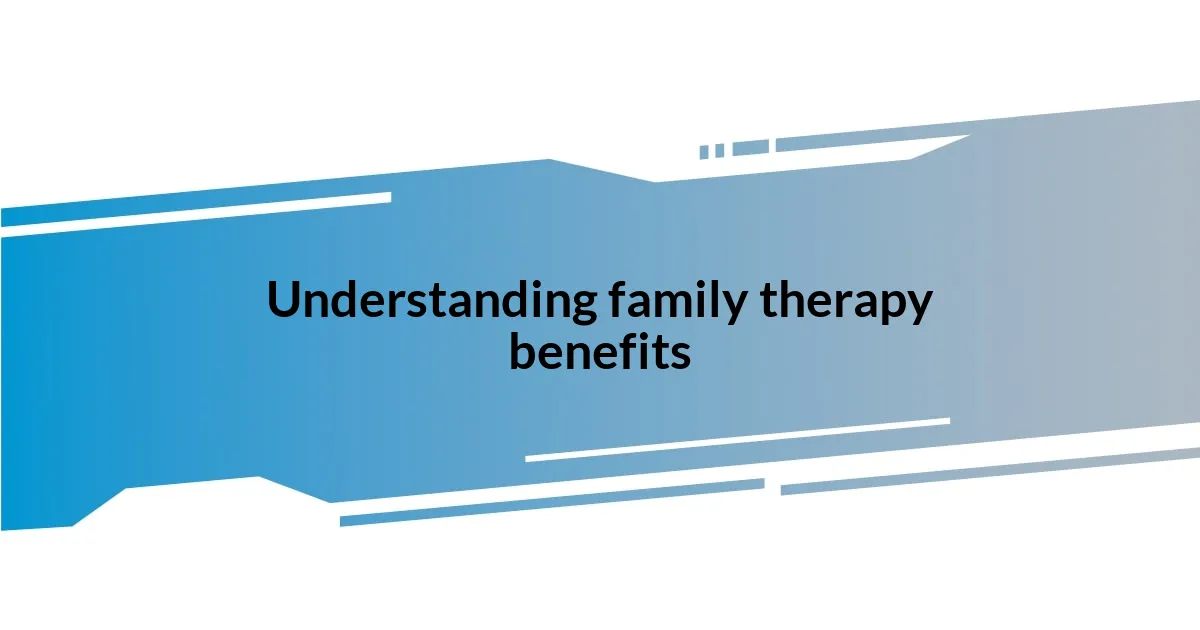
Understanding family therapy benefits
One of the most significant benefits of family therapy that I’ve experienced is the enhancement of communication. I recall a session where a simple misunderstanding turned into a major conflict among my family members. During therapy, we learned to express our feelings without fear of judgment, transforming that tension into an opportunity for connection. Have you ever noticed how often we assume others understand our feelings? It’s eye-opening to realize that clear communication can truly bridge those gaps.
Another advantage I’ve found is the focus on shared experiences. Family therapy encourages each member to share their perspective, creating a richer understanding of our collective struggles. I remember the moment my sibling opened up about their feelings of isolation within the family. It was a heartfelt revelation that reshaped our dynamics and brought us closer together. Isn’t it amazing how shared vulnerabilities can foster compassion and support?
Finally, family therapy cultivates stronger relationships by addressing underlying issues that we often overlook. During our sessions, we tackled topics like trust and respect, ultimately unveiling patterns that hindered our connections. For me, recognizing these patterns was a game-changer. I often ask myself: how many misunderstandings could we avoid if we only took the time to explore the roots of our challenges? Therapy provided that critical space for reflection, giving us the tools to build healthier relationships moving forward.
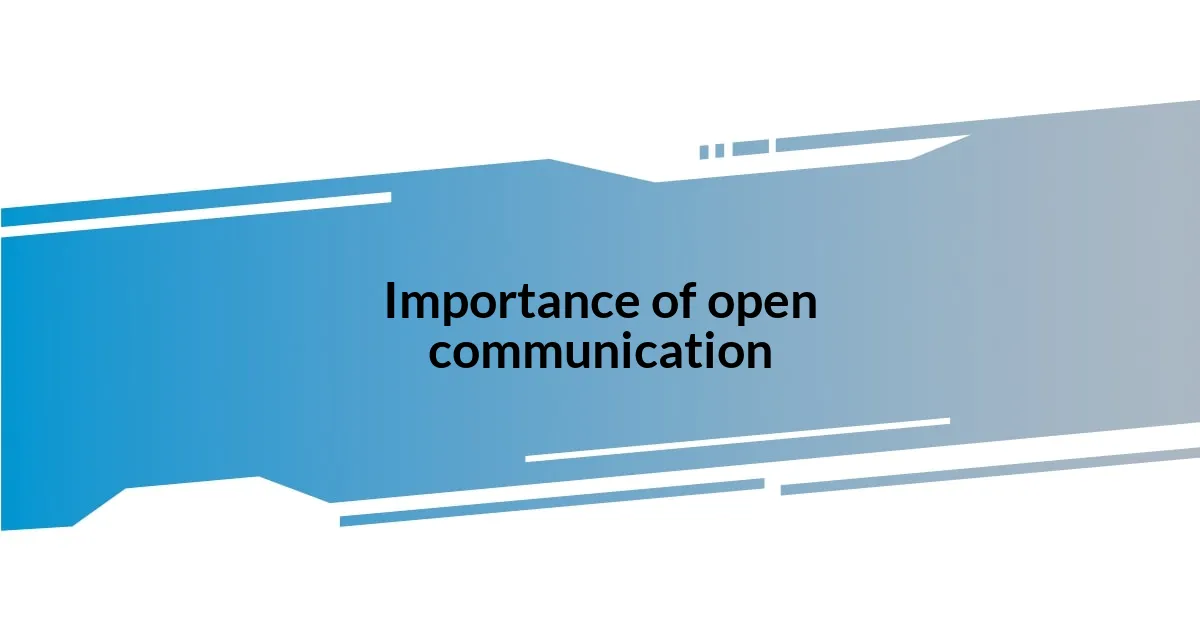
Importance of open communication
Open communication is the backbone of any healthy relationship, especially within a family. I vividly remember a family therapy session where we were encouraged to speak freely about our feelings. I shared my frustrations about not feeling heard, and, to my surprise, my sister admitted she felt the same way. That moment was profound; it was as if we had lifted a weight off our chests. I realized then that when family members openly express their feelings, it paves the way for understanding and healing, making each person feel valued and heard.
To illustrate the importance of open communication further, consider these key aspects:
- Prevents Assumptions: When we share our thoughts and feelings directly, it minimizes misunderstandings, which are often the root of conflict.
- Builds Trust: Regularly communicating our emotions helps in establishing trust within the family, allowing members to rely on one another.
- Encourages Support: Open dialogue fosters a climate where everyone feels safe to seek help, knowing they won’t face judgment.
- Promotes Emotional Growth: Discussing feelings not only helps us grow individually but also strengthens family bonds, leading to deeper connections.
- Facilitates Problem Solving: When everyone communicates openly, it becomes easier to resolve conflicts collaboratively rather than leaving issues to fester.
Through my experience, I’ve found that the more open we are with one another, the closer we become as a family. It’s a beautiful realization that open communication not only relieves emotional burdens but also nurtures lasting relationships.
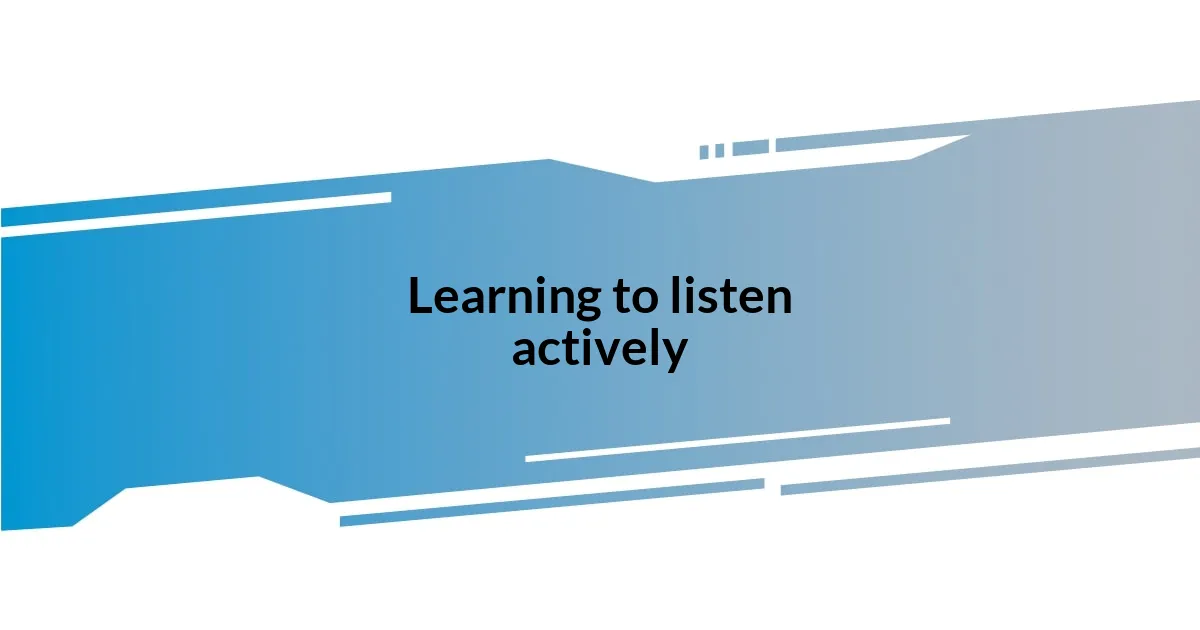
Learning to listen actively
Active listening is more than just hearing words; it’s about engaging fully with the speaker. I remember a session when my therapist had us practice this skill. I felt the difference when I focused on my parents’ expressions and tone rather than formulating my response. That simple shift in attention helped me grasp not just their words, but their underlying emotions, fostering genuine connection.
To illustrate how much of an impact active listening can have, consider moments when you’ve felt truly heard. Doesn’t it create an immediate sense of validation? I can recall a particular instance when my brother shared his struggles. By listening without interruptions and responding thoughtfully, I saw relief wash over him as he felt understood. This experience reinforced my understanding that listening actively can transform conversations into meaningful exchanges.
Looking back, I realize that many conflicts stemmed from me not fully listening. This revelation has encouraged me to ask clarifying questions and summarize what I’ve heard. It’s an ongoing practice, but the rewards are invaluable. How many rich conversations would we miss if we didn’t take the time to listen actively? The act of listening can create intimacy and trust, something every family dearly needs.
| Active Listening | Passive Listening |
|---|---|
| Engages with emotions and body language | Focuses only on spoken words |
| Fosters deeper connections | Creates misunderstandings |
| Encourages empathy and validation | Leaves speaker feeling ignored |
| Promotes thoughtful responses | Results in hasty replies |
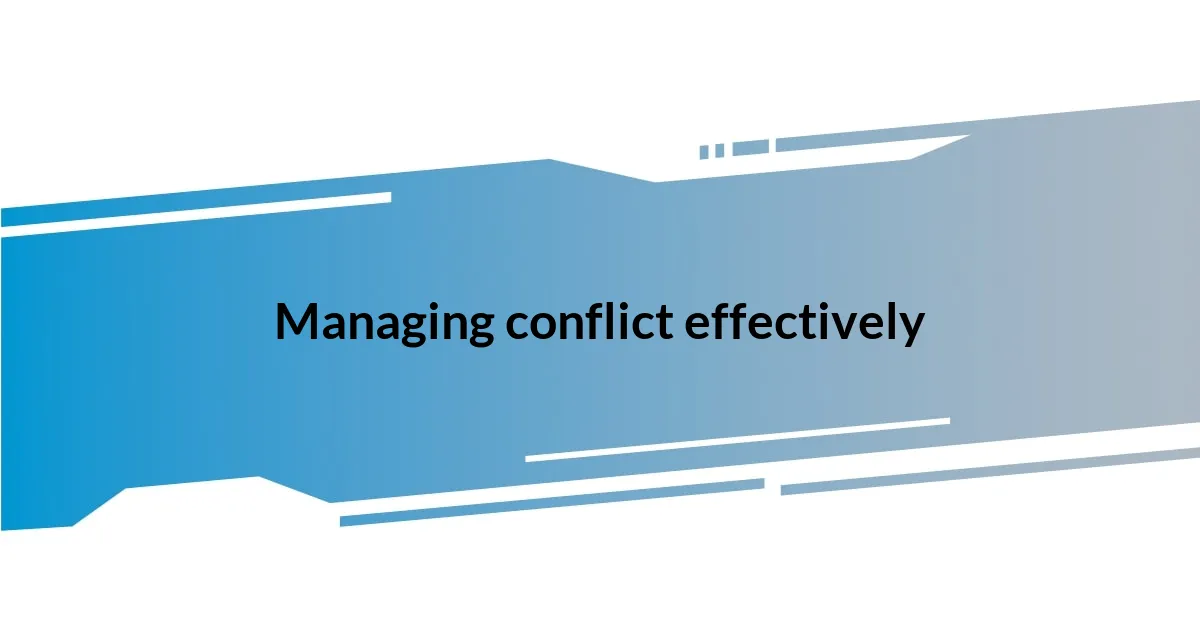
Managing conflict effectively
Conflict is a part of any relationship, but how we manage it can make all the difference. One lesson I learned in family therapy was the importance of approaching disagreements calmly. I remember a heated discussion with my sister about household chores. Instead of raising my voice, I took a deep breath and expressed how overwhelmed I felt. This shift in my approach not only diffused the tension but opened up a dialogue where we could both express our needs without fear of escalation.
A key strategy I found helpful is identifying the underlying emotions driving the conflict. During another session, I realized that my frustrations were rooted in feeling unappreciated. Once I shared that with my family, everything changed. They responded not just to the conflict but to my emotions, which helped us align on solutions together. Isn’t it amazing how understanding ourselves better can lead to more productive conversations? By focusing on feelings rather than just the situation, we cultivated empathy and connection.
Lastly, I learned the power of compromise. Conflicts often arise when everyone wants their way. I recall a family vacation planning fiasco; we had differing opinions on the destination. Instead of insisting on my choice, I suggested we each take turns choosing the vacation spot for the next few years. It was a small change, yet it fostered collaboration and made every family member feel valued in the decision-making process. How many conflicts could we resolve if we embraced compromise as a way to foster unity?
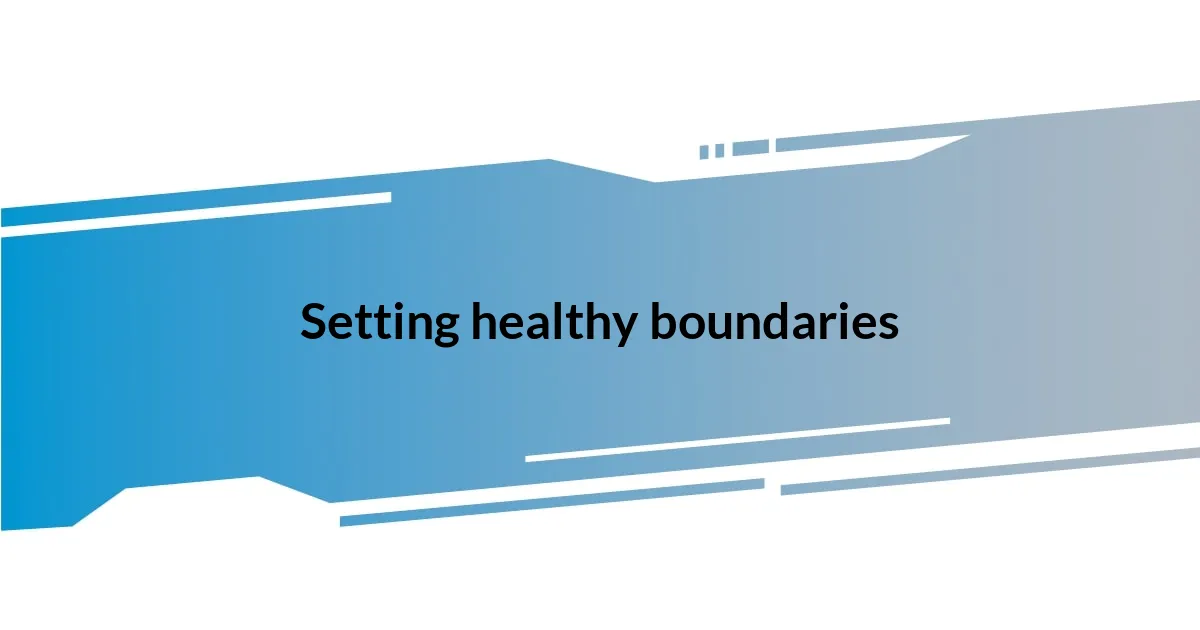
Setting healthy boundaries
Setting healthy boundaries has been a revelation for me in family therapy. I vividly recall a moment when I realized how often I blurred the lines between caring and being overburdened. It hit me during a conversation with my mom where I instinctively agreed to take on more responsibilities to help her. Boundaries started to feel like a lifeline; by expressing what I could and couldn’t do, I found a balance that freed both of us from unspoken expectations. Can you relate to that feeling of overwhelm?
Through this journey, I discovered that communicating my limits is just as important as understanding them. In one particularly eye-opening session, we discussed how my need for personal space wasn’t selfish; it was necessary for my well-being. I remember telling my brother that I needed certain times in the week to recharge on my own. The surprising part? He expressed relief upon hearing it, realizing he also needed boundaries. Isn’t it empowering to know that this kind of honesty can strengthen relationships rather than weaken them?
Establishing these boundaries has not only safeguarded my mental health but has also fostered respect within my family. One day, after a particularly tough week, I said no to last-minute dinner plans that I usually would have jumped into. The slight guilt melted away when my dad expressed admiration for me standing firm. It made me think: how many times do we forsake our own needs for the sake of others? Setting healthy boundaries can feel like a difficult lesson, yet it’s the key to nurturing healthier, more fulfilling relationships.
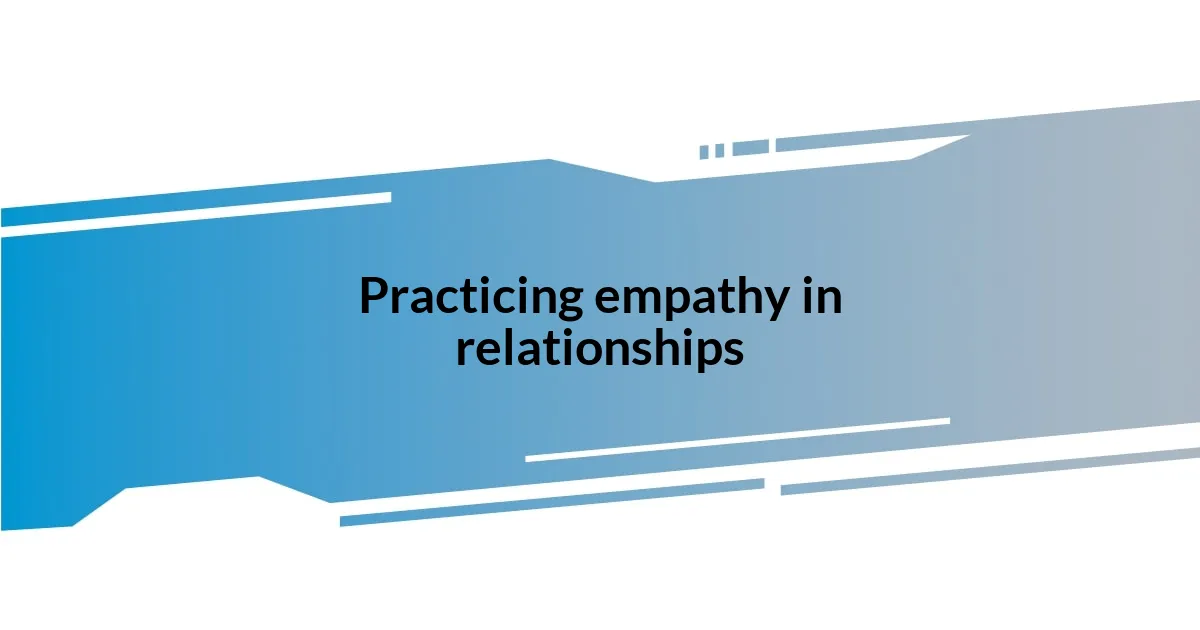
Practicing empathy in relationships
Practicing empathy in relationships has been one of the most profound lessons I’ve taken away from family therapy. I remember a moment when my partner was feeling stressed about work. Instead of jumping in with solutions, I simply sat with her, listened, and reflected back what I heard. It felt powerful to realize that sometimes, simply being present is the greatest act of empathy we can offer. Have you ever tried just listening without trying to fix the problem?
On another occasion, I faced a misunderstanding with my father. I had assumed he was criticizing my choices when he shared his concerns. Instead of defending myself, I chose to approach him with curiosity, asking him to clarify his feelings. That conversation turned out to be a revelation; we both discovered that he was coming from a place of love, not judgment. Isn’t it fascinating how shifting our perspective can transform our connections?
I’ve also found that practicing empathy isn’t always an easy road. There are days when I struggle to understand my siblings’ views, particularly during family disagreements. But when I make the conscious effort to put myself in their shoes, I often find common ground. I remember a night filled with family banter, where my sister’s frustration over a minor issue turned to laughter when I acknowledged her stress. How often do we underestimate the power of a simple acknowledgment? It’s these small yet significant moments of understanding that build deeper relationships and foster a sense of belonging.
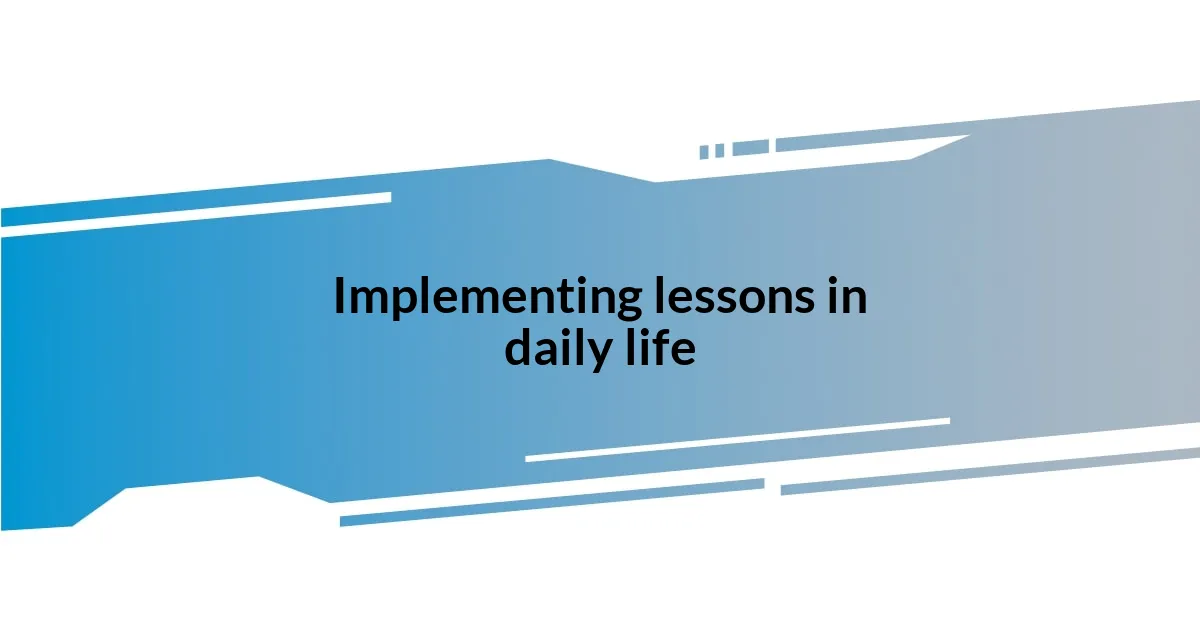
Implementing lessons in daily life
Implementing lessons I learned in family therapy into my daily life has been transformative. I remember the first time I practiced active listening. During a heated discussion with my partner, I consciously set aside my urge to intervene. Instead, I leaned in, maintained eye contact, and focused solely on what she was saying. The relief and gratitude in her eyes made me realize that sometimes, being fully present can speak louder than words.
Emotions often bubbled up unexpectedly as I began to express my feelings more openly. I recall a family gathering where I felt overwhelmed by noise and chaos. Normally, I would just pull through, but this time, I took a step back. I excused myself for a moment to breathe and gather my thoughts. When I returned, I explained how I was feeling. My family respected my need for a breather, which left me feeling understood and more connected. Isn’t it remarkable how sharing vulnerability can invite others to do the same?
Another shift I embraced was admitting when I didn’t know something instead of pretending to have all the answers. On a recent weekend, my son asked me about a complex topic I was unfamiliar with. Instead of dodging his question or giving a half-hearted answer, I admitted I didn’t know and suggested we research it together. This moment not only turned into a bonding experience but also showed him that it’s okay to ask questions and explore answers together. Doesn’t it feel liberating to drop the façade of perfection and connect through authenticity?